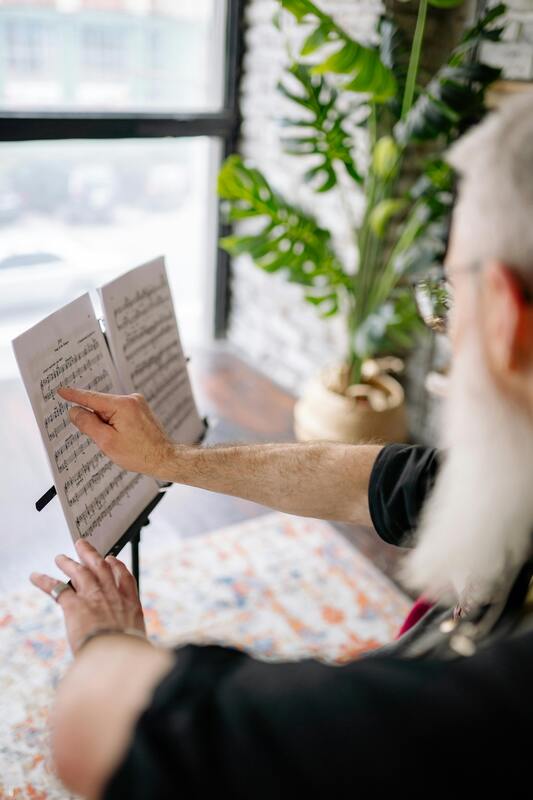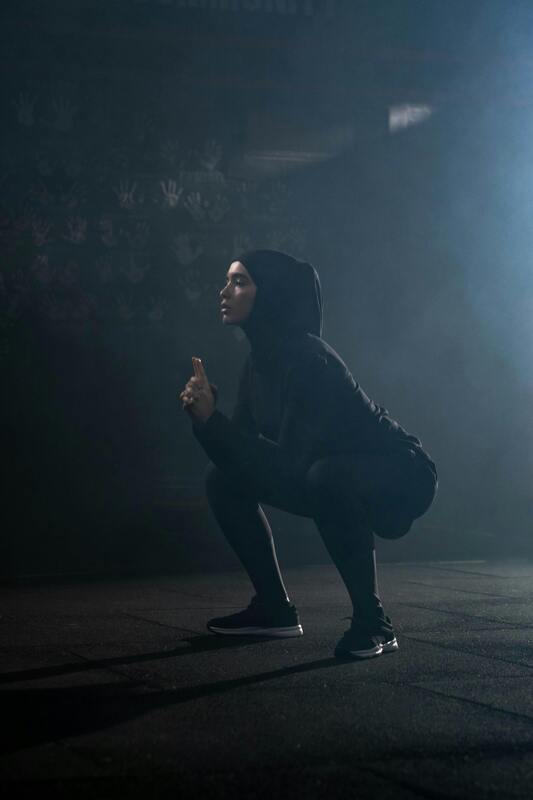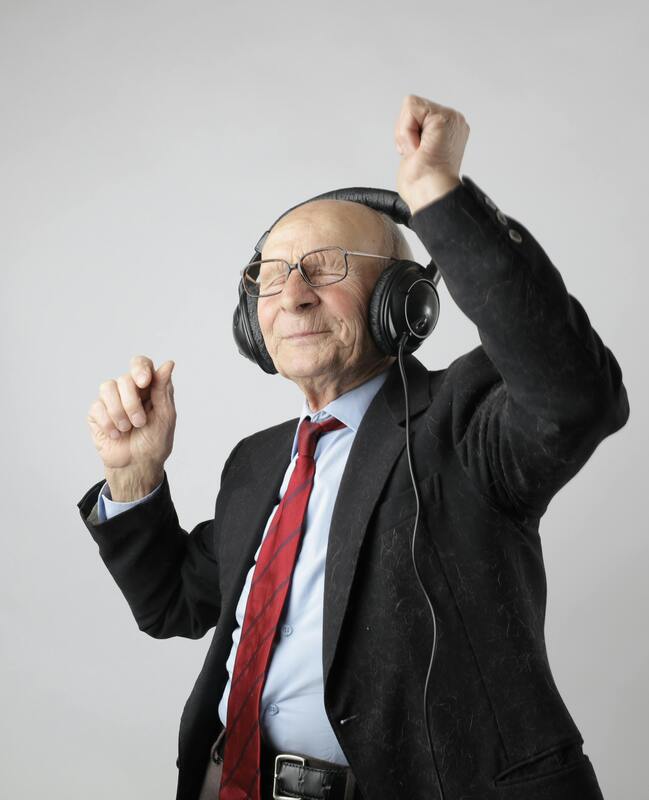Elaina Robbins, Singer and Voice Teacher
|
This is part of a series of blog posts derived from my book, The Five-Minute Singer. You can view video versions of most of this information in the free introductory series to the Five-Minute Singer vocal program. First, if you haven’t yet read the other articles in this series—"What I Wish Singing Classes Near Me Taught About How Singing Works,” “My Best Tips on How to Become a Better Singer when Teaching Voice Lessons Near Me,” “How to Sing Better by Changing Vocal Habits in Singing Classes for Adults,” and “How to Become a Singer with a Practice Method Voice Teachers Near Me Aren’t Using,”—please turn back for now and read those first. These articles are supposed to go sequentially, so you need the information in those for this article to help you learn how to get better at singing. This article is for singers who already have a considerable amount of natural talent but who want to figure out how to get better at singing. Maybe you’re working with vocal teachers near me, or maybe you’re figuring things out on your own. Either way, if you fall into this group, think, for a moment, of people who are even better--the best singers in the world. What Vocal Teachers Near Me Don’t Emphasize about Talent and Natural Technique Like Olympic athletes, many of these singers are simply freaks of nature. They sing at an extremely high level thanks to their anatomy and mental musical faculties, and the vast majority of them don’t have to drastically change their natural techniques to “get” singing. It’s already easy for them. These singers still practice and train, but they don’t need to do the kind of nitpicky, body part-based work described in this book. In fact, many great singers are great despite poor anatomical vocal habits. Look up a video of Kathleen Battle, for example, and observe her jaw alignment. Even with that visibly misaligned chin, Battle’s gorgeous singing made her a world-renowned soprano. Mind you, this is the very top of the top, and even very gifted singers can (in my opinion) benefit from anatomical breakdown because they can use it to finetune their technique and address any weaknesses. However, when you’re messing with the balance of singing, you can temporarily get worse. Think about it like a Jenga tower: your Jenga tower as a gifted singer may not stand perfectly straight, but it’s standing and stable. Start yanking out blocks and trying to adjust the tower, and the entire thing may topple over. This feels horrible and disorienting, and if you’re an active singer with upcoming performances, it’s also impractical. What if, during the course of developing new habits, you find you can no longer do something you used to do? There is a workaround. Here is to get better at singing without throwing out your singing baby with the bathwater. Three Steps to Get Better at Singing without Losing Skills
Here’s a good example. I once had a student who struggled with overly low laryngeal placement and general laryngeal muscular engagement when singing low notes. (I will explain these terms in Part II of my book along with the head voice/belting terms used in the next paragraphs.) In the process of alleviating laryngeal tension, something in her vocal balance went awry, and she couldn’t access full chest-voice low notes anymore. In a lesson, to fix this, I had this student revert back to her old technique. Surprisingly, due to the work she’d done on laryngeal relaxation, she immediately sang loud, low, chest-dominant notes with much less tension than before. Then, over time, she practiced minimizing her laryngeal lowering without losing those low notes again. Then, we could continue her journey on how to get better at singing. The one caveat to this is The Golden Rule. Vocal teachers near me and far would all agree with this one. If reverting back to your old technique causes pain or discomfort, it’s not worth it. I see this most commonly with high notes, either belted or at the top of head voice. If your old high note technique involves so much breath pressure and tension that it was hurting you, you may need to knock your tower down and rebuild your upper register in a healthy way. It’s okay to lose a few notes at the top to save your vocal health! How to Get Better at Singing with an Option Vocal Teachers Near Me Don’t Offer Whether you’re a naturally gifted singer or are just trying to find your bearings, there’s so much you can do to get better at singing without springing for expensive and time-consuming traditional lessons. Sign up for my online vocal training program for a cost-effective learning experience—most vocal teachers near me don’t have anything like this. You can also sing up for normal online or Fort Wayne singing lessons with me, or you can sign up for my hybrid program—my favorite way to teach, combining both personal voice lessons and hyper-efficient online vocal training. Whatever avenue you choose, stay true to your natural talent, and happy singing!
0 Comments
This is part of a series of blog posts derived from my book, The Five-Minute Singer. You can view video versions of most of this information in the free introductory series to the Five-Minute Singer vocal program.
First, if you haven’t yet read the other two articles in this series—"What I Wish Singing Classes Near Me Taught About How Singing Works” and “My Best Tips on How to Become a Better Singer when Teaching Voice Lessons Near Me”—please turn back for now and read those first. These articles are supposed to go sequentially, so you need the information in those for this article to make sense. Now that you’ve learned about the big picture of how singing works and my four singing rules, let’s discuss what this book is all about: how to sing better by changing vocal habits. Everyone has specific habits with which they go about their lives. You walk, type, talk, brush your teeth, and do a million other things each day based on habit. You don’t consciously think about putting one foot in front of the other when you walk—your body just knows what to do. As I teach students of my Fort Wayne voice lessons, when you sing, you likewise do many things automatically. You probably have some helpful and healthy vocal habits already. But, more than likely, you may have other habits that detract from your singing. These mysterious bad habits may limit your range and make singing unpleasant, uncomfortable, or even harmful to your body. If you’ve taken singing classes for adults, you might already be aware of some of these bad habits. If you develop new habits that improve your singing, you’ll implement them automatically, even when you’re not thinking about them or you’re under pressure. You can probably manage to put one foot in front of the other to walk without thinking about it even when you’re stressed, right? That’s what The Five-Minute Singer is all about: using concentrated practice to develop new vocal habits. That’s how to sing better automatically regardless of your emotional state or level of focus. This is part of a series of blog posts derived from my book, The Five-Minute Singer. You can view video versions of most of this information in the free introductory series to the Five-Minute Singer vocal program. I think learning to sing starts with a basic knowledge of what’s happening in there in the first place. If more singing classes near me and afar taught this basic concept, people would probably be a lot less confused. Why? The big picture of singing is not at all intuitive. This is something I try hard to cover in my online singing program. Here’s the scoop: the voice is basically a wind instrument. We breathe in, and the breath provides fuel for the sound. Because the muscles of breathing cause external movement localized primarily in the abdomen (below your chest), the effort of singing largely occurs in the abdomen as you inhale and regulate your airflow. You can see this in the bottom layer of this friendly singing skeleton.
Next, we have the middle layer. Most people know their vocal cords are located in the larynx, which sits in the throat. Therefore, people think they need to exert effort in this area, “reaching” or “pushing” to “hit” notes. Does any of this sound familiar? This is certainly what I used to do. In truth, your vocal cords are tiny and protected inside the hard cartilage of the larynx. The movements of the vocal cords are miniscule. Many muscles intersect in this area, and you do have to engage some facial muscles to form words. But, as a general rule, keeping your chest through your lower jaw as loose and relaxed as possible reduces resistance and fatigue, promoting efficient singing. Annoyingly, this area—the middle area on our skeleton—includes a lot of body parts most people pressurize when singing. If you’ve seen a singer visibly straining when singing, you know what I’m talking about. You’ll find the last piece of the puzzle, a small flap made of muscle and connective tissue called the soft palate, on the roof of the mouth. Lifting the soft palate prevents you from singing out of your nose, streamlining the vocal tract and, again, reducing resistance and fatigue. So, when you think about it, you’ve got layers of effort and relaxation: soft palate engaged, middle section relaxed, breathing muscles engaged. It is not at all intuitive. Does this occur naturally when you sing? If you’re like most people, probably not. That's totally normal. Great talent can be dazzling. Naturally, when you hear an extraordinary singer, you may automatically wonder if that person teaches voice lessons. If they can sing like that, they can teach you to sing like that, right? The truth is, when seeking in-person or online vocal training, the best singer might not always be the best teacher. I’m going to get a little in the weeds here because this is something I feel pretty strongly about, and it has roots all the way down into how singers and teachers are educated. This article about the typical “singing training near me” approach versus more targeted online singing class training has been bubbling around in my brain for a long time. Getting it out here feels sort of vindicating. I’m going to be candid—this article might upset some people offering singing training near me and across the globe, but it was not written with that intention. This article consists of my observations and opinions on the singing lessons system itself. This is all based on the anecdotal experiences of singing lessons and the experiences of many others I have observed. No single person is to blame—there is no malintent, no conspiracy. So, whether you’re looking for “singing training near me” or for an online singing class, here’s why you shouldn’t necessarily hear the instructor’s fantastic runs and fail to look at their actual credentials and experience. I think this also explains why I think online singing class formats are so valid if done correctly. Great Singer Does Not Mean Great In-Person or Online Vocal Training Instructor
Beware someone who advertises under “singing coach near me” or as an online singing class teacher whose only credentials are stage experience. I liken singing to sports a lot, so let’s think for a moment about Michael Phelps, who won a total of 28 Olympic medals for swimming. He has worked incredibly hard and no doubt knows a lot about swimming. But you can’t ignore the fact that he is 6’4”, with a large torso, rather proportionately short legs, and large, flipper-like feet that earned him the nickname “Flying Fish.” Experts have noted that he had “the perfect body for swimming.” His success is due to his body as much as it is his brain. Let’s pretend you were enormously wealthy and somehow managed to hire Phelps as your swimming coach. Will studying with Phelps mean you will become a champion Olympic swimmer? Obviously not. Phelps does not know what it’s like to be in your body, which is probably not as naturally suited for swimming as his. But he does have a lot of training under his belt at this point, so despite his natural talent and insane physique, he could likely help you improve. Now, let’s change the scenario a little to start equating it with singing training. Pretend for a second that we live in an alternate universe where Michael Phelps never sought training. He looks pretty much the same, and he is still a fabulous swimmer. But he isn’t as good as trained Phelps, and he is also completely self-taught, relying on instinct and maybe some random YouTube videos or articles about swimming. Since everything comes pretty naturally to him and he doesn’t have an education of the anatomy or theory behind what he’s doing, this Phelps would probably be a bad teacher. After all, you can’t just morph yourself into the Flying Fish. I’m sure you can see where this is going when it comes to singing training. A fabulous, amazing, incredibly gifted, self-taught singer knows intrinsically how to sing with their brain and their body. That does not mean they can teach you to sing with your brain and your body. Your brain may not be as musically inclined; your body may not be as perfect for singing as theirs. You’re working with a totally different instrument and mental skillset, and without the “translation” ability that an education brings, that fabulous, gifted singer probably won’t make much of a vocal coach. Wondering how to improve singing voice quickly? Before I give you some tricks to try immediately, please remember that improving singing is a marathon, not a sprint. I remember once having a student ask me how many lessons they’d need to learn how to sing, and it definitely gave me laugh! This is sort of like asking how many physical trainer appointments you need to look like Arnold Schwarzenegger in his prime. It’s just not quantifiable, and it depends a lot on what you do in between lessons. That being said, if you’re wondering how to improve singing on the fly, I do have some advice. You can use these five holistic tools to start to shift your mindset around, notice more about your vocal habits, and see some results in a relatively short period of time. How to Improve Singing Voice Tip #1: Use a Karaoke App Melodies comprise of rhythm and pitch. If you have issues with either, a karaoke app is a fun way to practice! The best karaoke apps work sort of like Guitar Hero—they have a guide showing you what rhythms/pitches to sing when, and they show you what notes you’ve actually sung. When working with students, I’ve noticed that being able to see notes in real time helps people to sing more accurately. Looking at whether you’re flat or sharp or whether your rhythm is wonky can help hone your musical ear. Plus, practicing with an app like this makes practice more fun! It feels less like work and more like a game. When using a karaoke app to augment the best online singing lessons you can find, I recommend choosing one that:
Check out my video on karaoke apps and intonation for more on this topic. How to Improve Singing Voice Tip #2: Sing in Front of the Mirror My online vocal training program, The Five-Minute Singer, relies on four senses: sight, sound, touch, and kinesthetic awareness (body awareness). You might think sound is the most powerful of the four, but I actually think sight is even more important, especially for beginners. You might not know exactly what to listen for when you’re starting out, but the mirror doesn’t lie! When you sing, you should look surprisingly normal and relaxed. My favorite famous contemporary example of this is Whitney Houston’s Star-Spangled Banner (skip to 1:15). Do you see how normal she looks? No straining, no heaving, no weird muscles bulging out, easy lowering of the jaw for high notes? That’s what masterful singing looks like. Because classical music is technically the most challenging, classical singers are in my opinion the best examples of this. Let’s look at another famous video: Luciano Pavarotti’ Nessun Dorma from Verdi’s Turandot. Once again, it looks easy. No straining, no coiling up for the high note, loose jaw movement, grounded stance—tremendous sound. No amount of extra jerking, bulging, and straining will help you sound like that. If you learn what optimal singing looks like, you can stand in front of the mirror and watch yourself as you practice, ensuring you look the way you should. Here are some things you can look for:
How to Improve Singing Voice Tip #3: Record Yourself Recording yourself has many of the same advantages as practicing in front of the mirror, except you can also use it in a few additional ways. First, you can view yourself in profile or at other angles to check your alignment. Second, you can listen to your performance to check your sounds for signs of vocal faults, including pitch and rhythmic accuracy. This can be very eye opening. When recording yourself, I recommend finding decent lighting and an angle that lets you see everything from the torso up. If you’re a decently loud singer, you may need to place your device far enough away so you don’t distort the sound. How to Improve Singing Voice Tip #4: Use Your Hands As I mentioned already, one of the senses I advocate using is touch. This means putting your hands in various spots on the body to feel what’s going on. I find that placing hands in problem spots often works the same way watching a child works—if you’re looking right at the kid, the kid is way more likely to behave! So, if you’re wondering how to improve singing fast, keep your hands on those misbehaving body parts to supervise them accordingly. Here are some useful spots you can place your hands:
How to Improve Singing Voice Tip #5: Get Low When you sing, your effort should come from your breath, which happens primarily below the armpit line thanks to the diaphragm and the intercostals. Everything above that line, from the chest and shoulders to the neck, jaw, and tongue, should be relatively loose and floppy so as not to interfere with vocal production. Check out my video on the big picture of singing for more on this. This is the opposite sensation to what many people experience. Lots of people feel the effort of singing up high, especially in the throat. An easy way to correct this is to try to shift that effort down. Feel like you’re working hard with your breathing muscles instead of your neck. Use your air to be emotional and expressive rather than employing your neck or large facial muscles like the masseters. Hand/arm gestures can help with this; my favorite is a low, circular motion like waves. You can also try bouncing around from the knees so you feel that lower center of gravity. How to Improve Singing Voice the Smart Way
You might have noticed that these five tips for how to improve singing voice quality all rely on self-awareness, with a focus on body parts. This is a hugely important tenant of signing, since as singers, our body is our instrument! That’s why I designed my online vocal training program to center around all the most important body parts involved in singing. I tried to make one of the best online singing courses I could by focusing on habit-based, anatomical practice. The course teaches you how to improve singing by training your various body parts to do what they are supposed to do to help you sing your best. Once these habits are locked in, your vocal instrument will run smoothly whenever you sing, even if you’re nervous or on autopilot. Sound good? Learn more here, and happy singing! It seems like some people pop out of the womb with amazing voices. Singing, like many other skills, is a talent, and it’s true that some people just have “it” naturally. But what if you don’t have “it”? Can you learn how to sing, or do you need to be born with it? Plenty of people seek out the best online voice lessons or in-person instruction they can find, but some don’t even get that far because they believe they are a lost cause. Does that sound like you? If you are scared that your voice is beyond help, you’ve come to the right place. Can you learn how to sing? I really believe anyone can. In this article, I’ll explain why anyone can learn to sing, the one exception to this rule, and what to do if you feel like there's no hope. Can You Learn How to Sing? So, can you learn how to sing if you’re not naturally a fabulous singer? Absolutely! I often compare singing to sports. I, for example, am 4’11”. I will never be a fantastic basketball player. But what if I really, really wanted to play? I could practice footwork and shoot hoops in my driveway until I became extremely accurate. I could play basketball at the gym or join a community league, and I could have a ton of fun in the process. I might never play with the greats, but if I was really passionate about it and doing it for self-fulfillment, who could tell me I shouldn’t do it? Singing is very much the same. People tend to underestimate their natural talent, but let’s say for the sake of argument that you really have none at all. Who cares? You might never sing on a national stage, but is that even what you want? If you enjoy singing and simply want to improve as a hobby, there is absolutely no reason why you shouldn’t try. Working up to recording your own music, participating in local productions, or just feeling brave enough to pick up the mic at a karaoke bar are all great goals. Plus, there are plenty of wildly successful singers who aren't actually virtuosic vocalists, instead relying on songwriting and instrumentals to carry their vocals to fame. Low Skill Level = Fast Progress There’s also a silver lining to starting with little natural talent. When teaching in-person or online vocal lessons, I’ve found that students with low skill levels often improve the most, and the most rapidly. Again thinking of fitness, let’s say two people want to lose weight. One of those people weighs 400 pounds, and the other weighs 175. Who has the potential to lose more weight? In many ways, substantive progress gets harder the better you are at something. Losing the last five pounds can be harder than losing substantial weight at the beginning of a weight loss journey. So, if you feel like your singing voice is beyond help, you might find that when you start learning how to sing, progress is swift and satisfying. I’ve seen it happen time and time again. Can You Learn How to Sing? The One Reason You Should Hold Back In my opinion, there’s only one reason why someone shouldn’t learn to sing: vocal health. Back to the fitness analogy here. Let’s say I really wanted to learn to play basketball. My height isn’t a real issue, but what if I had bad knees from years of working out with poor form? Should I launch myself straight onto the basketball court anyway? Not unless I was looking to ruin my knees for life! I would first need to address my health issue before trying a new sport. The same concept very much applies to vocal health. A lot of people who want to sing and try to learn have unhealthy vocal habits (sort of like working out with poor form). Over time, they end up with injured, swollen vocal folds. Common signs of this include a raspy speaking voice, pain or discomfort when talking or singing, and fatigue/hoarseness at the end of the day. Does this sound familiar? If so, before you learn to sing, you have to rest up and get your cords healthy again. Then, when you start learning to sing, tread carefully and avoid over-practicing or singing in ways that might injure you. Can You Learn How to Sing If You’ve Tried and It Isn’t Working? What if you’ve signed up for the best in-person or online voice lessons you can find and tried your hardest to learn, but you’ve hit a wall? Some people start off feeling optimistic, but as they start to learn, they become discouraged by their lack of progress. As with any skill, singing also takes time and effort to master—it won’t happen right away. But singing can also be confusing, and there is no standard way of teaching singing, which adds to the frustration. I certainly felt discouraged a lot as a student, particularly because of the way voice is taught. Voice lesson instruction often focuses on preparing a specific song, triaging the biggest vocal issues without always explaining the anatomy behind them. This can help you sing that one song better, but in my opinion, it has inconsistent results and doesn’t leave you with much learning you can apply to other songs. That’s why I created The Five-Minute Singer. Can You Learn How to Sing Online?
My online vocal training program, The Five-Minute Singer, is a habit-based learning method relying on true understanding of the vocal instrument. In it, you’ll learn how the voice really works and which body parts are supposed to be doing what. You’ll learn to control each body part one at a time, creating new vocal habits that take over automatically as you sing. This method helps you actually understand what you’re doing, organize your practice time, and see real, quantifiable results quickly. So, if what was supposed to be the best online vocal lessons left you feeling like you were a lost cause, I encourage you to try out my course. Taking ownership of your instrument is very satisfying. Once you get how the voice works and are taking steps towards improving, you’ll definitively know the answer to the question, “Can you learn how to sing?” So, you want to improve your singing. Maybe you’re a high school student and have been cast in the school musical or show choir. Maybe you’re an adult who wants to audition for the local community theatre, start a band, or join a local choir. Maybe you’re already singing professionally and want to increase your vocal stamina and abilities. The obvious answer to all of this is usually voice lessons. But how much are vocal lessons, really? It’s a great question in this economy. In this article, I’ll break down the two most important components of what determines how much vocal lessons are. We’ll go over some average prices, and I’ll show you how to make sure you end up with a competent voice teacher. I’ll also tell you about a very cost-effective alternative to voice lessons that can help you learn to sing for as little as $2 per week (for real). How Much Are Vocal Lessons? Let’s start with the big question. In general, at the time of writing, lessons range from $30 to upwards of $200 per hour. Average pricing is $60 to $70 per hour. The price of voice lessons depends largely on the teacher and the location. Let’s talk about the location factor first, since that’s pretty cut and dry. You’ll find the highest prices in large cities like New York and Los Angeles, where the cost of living is highest. Lessons in more rural areas, conversely, will likely be nowhere near as expensive. But, if you live in a major city, you’re not necessarily stuck with a major bill. if you’re open to virtual options, you can sign up for some of the best online singing lessons for a fraction of the cost of in-person lessons in your city. For example, I charge $55 per hour because I live in a low-cost area. The other big factor in pricing is the teacher themselves. This is a more nuanced topic, so I’ll put it on ice for a second. How Much Are Vocal Lessons with a Good Teacher? The top prices for voice lessons are charged by eminent teachers with connections with major production houses or academic institutions and star-studded rosters of highly successful professional students. The bottom prices are offered by teachers who are just starting out. I charged somewhere close to $30 an hour when I was working on my degrees, for instance. There are many excellent teachers who don’t charge top rates and probably many overpriced teachers who don’t have much to offer as well. However, one way to ensure you get the most bang for your buck is to pay attention to the credentials of your intended instructor. This can be trickier than you may think. The Licensing Quandary: Vetting Voice Teachers Unlike professionals like therapists, aestheticians, or lawyers, there is no required license to teach voice. Anyone can teach voice, and I mean anyone. Unfortunately, this means there are quite a few unqualified teachers floating around out there, especially online. How much are vocal lessons with these types of teachers? I’m guessing on the lower side. So, if you’re a price-conscious person, do your research and look for these criteria to avoid unqualified voice teachers. Academic Credentials: Does the person have a degree or degrees? In what field? Where are their degrees from? Performance Credentials: Does the instructor have substantial experience? Better yet, do they have experience in the genres you sing in? Are they still actively performing? Can you find recent videos of their singing or go see them live? Affiliated Institutions: Does the instructor teach at a local high school or university, for instance? Teaching Experience: How long as the voice teacher been at it? Do they have areas of specific expertise? Do they have reviews? Try Before You Buy Additionally, different teachers work well with different students, just like you have to shop around for the right therapist or doctor. I recommend you sign up for a trial lesson with any new teacher. During the lesson, look for the following:
How Much Are Vocal Lessons Over Time? This is the other big factor. Voice lessons are not a one-and-done kind of deal. Some people take a few voice lessons to work on a specific song or role, but this, in my opinion, is ill-advised. What you really want is a solid technical foundation you can rely on to help you sing any piece, not just help with one single piece. The cheapest possible scenario—that of hiring a teacher temporarily to help you prepare for a show—would likely require three to four lessons minimum and would therefore cost anywhere from $120 to $800. To make real technical progress, however, you need to take lessons for much longer. Think of singing like a sport. If you want to get really good at tennis, for example, you can’t just sign up for three or four lessons and consider yourself an expert. You need, not only those lessons, but a regular practice schedule and specific goals. So, with that in mind, let’s say you take weekly voice lessons for two years. This is not at all unusual; many people take voice lessons for much longer. If you went with the cheapest possible teacher, you’d pay $3,120. The average price of $65 lands at $6,760. That top-tier teacher would cost you $20,800! Yikes! Learn to Sing for Less with the Best Online Singing Courses
The enormous price tag of voice lessons is one reason I set out to create one of the best online singing courses I could. While teaching voice lessons, I realized I was covering the same information over and over with different students. It’s true that every singer is different, but ultimately, we’re all built the same way and have the same vocal body parts. By tackling these body parts one at a time and approaching singing as a habit-building exercise, you can gain a full understanding of the voice and learn the technical skills you need to sing freely, easily, and healthfully for a fraction of the price of normal lessons. My most expensive option is the Superstar Package. It includes 13 half-hour online lessons and 15 personalized video evaluations, costs just $650 when purchased in a one-time sum at the time of writing. The course is designed to take a minimum of a year to complete, but you can easily spend much longer developing anatomical habits for the many body parts covered in the course. However, assuming you complete the course in a year, let’s break down that pricing. Rather than paying an average of $65 per week, with my online singing course, you’d be paying $12.50 per week. You still get plenty of guidance via video submissions and a monthly lesson, and I promise you won’t be learning less than you would with traditional lessons. In fact, I designed my course to help you make quantifiable changes in a way that is highly unusual in traditional lessons. If finances are tight, my Bard package, which is completely self-guided, costs only $99! That’s $1.90 per week! I guarantee you won’t get a better deal than that. And, if you need some real-time guidance, you can contact me about purchasing a few a-la-carte lessons or video evaluations. How Much Are Vocal Lessons, and Is It Worth It? I definitely believe voice lessons are worth the cost. Good voice lessons can help you expand your range, eliminate nasality, gain vocal power and stamina, and much more. However, if you’re worried about the price of vocal lessons, online singing courses coupled with some input from a real teacher can accomplish a lot too. So get out there, look at the options, and feel free to reach out to me if you’d like to sign up! |























 RSS Feed
RSS Feed
